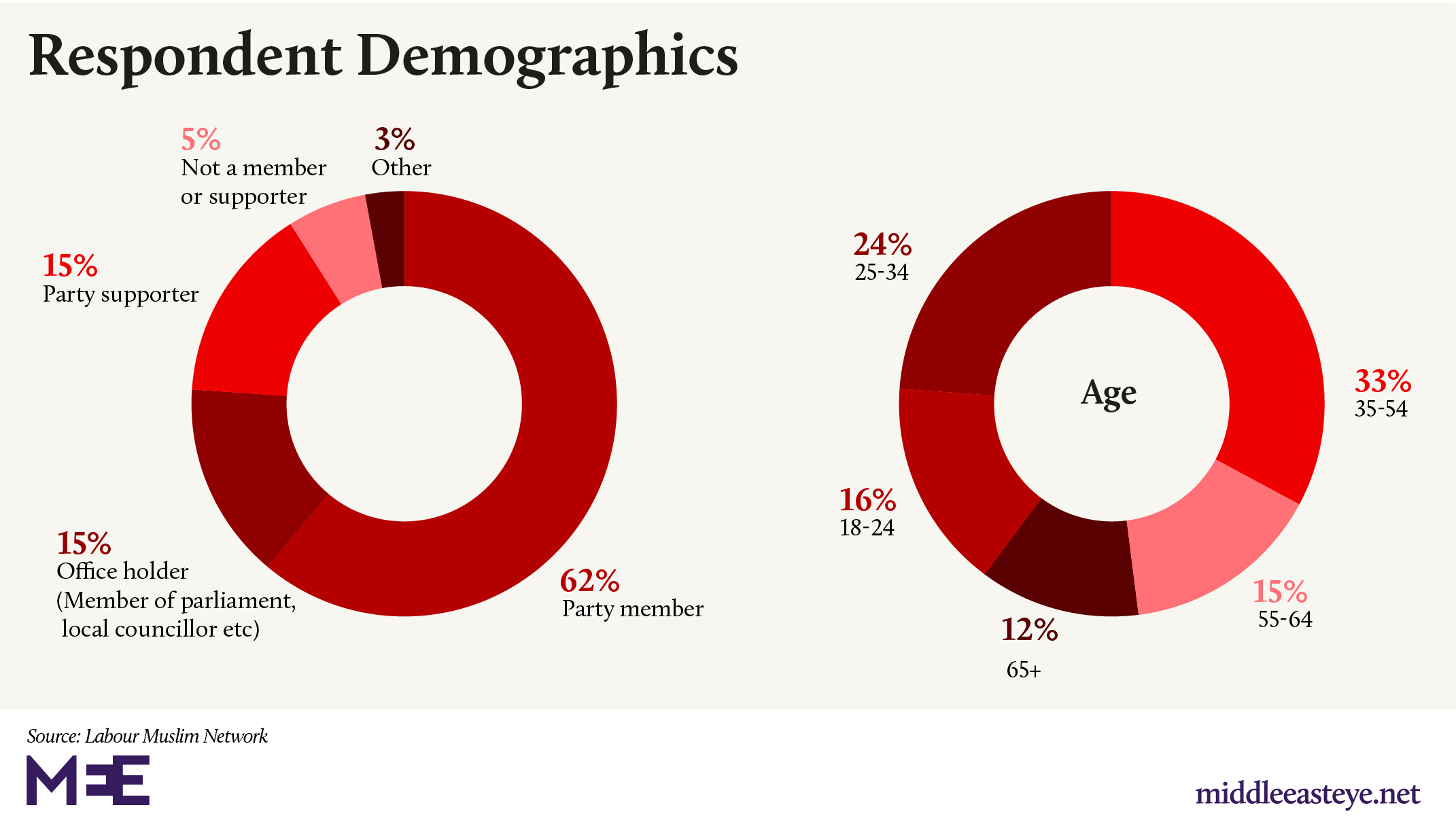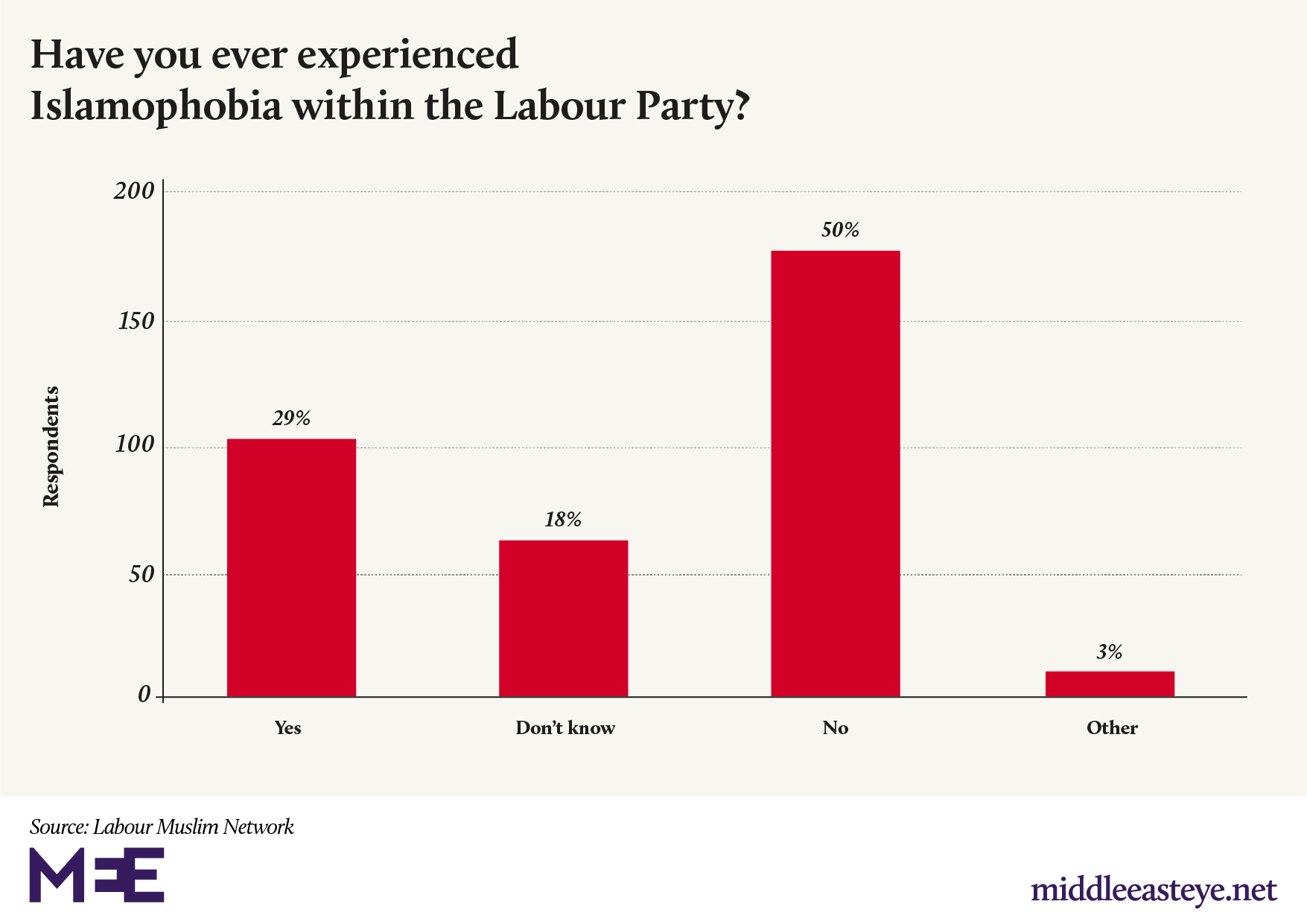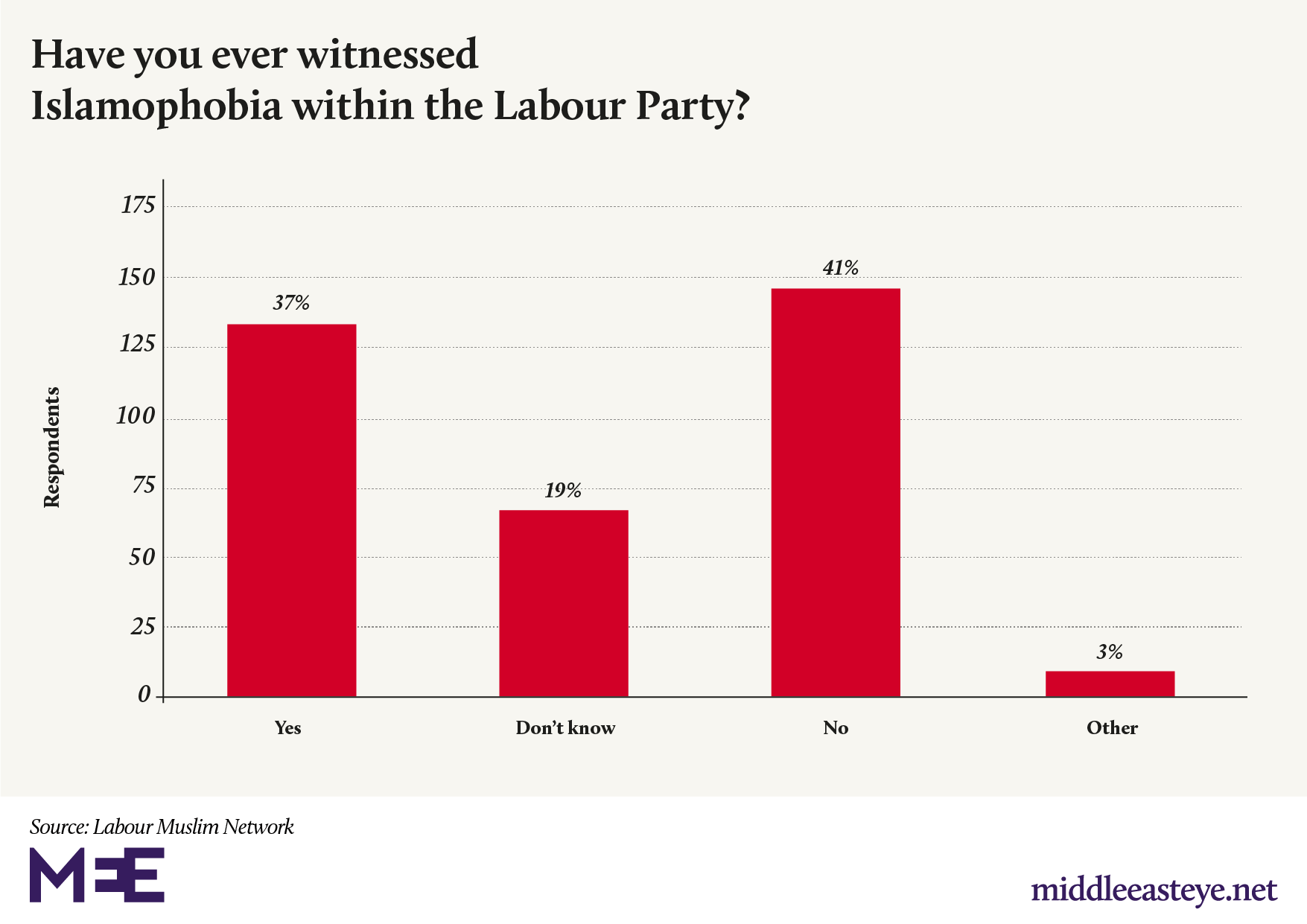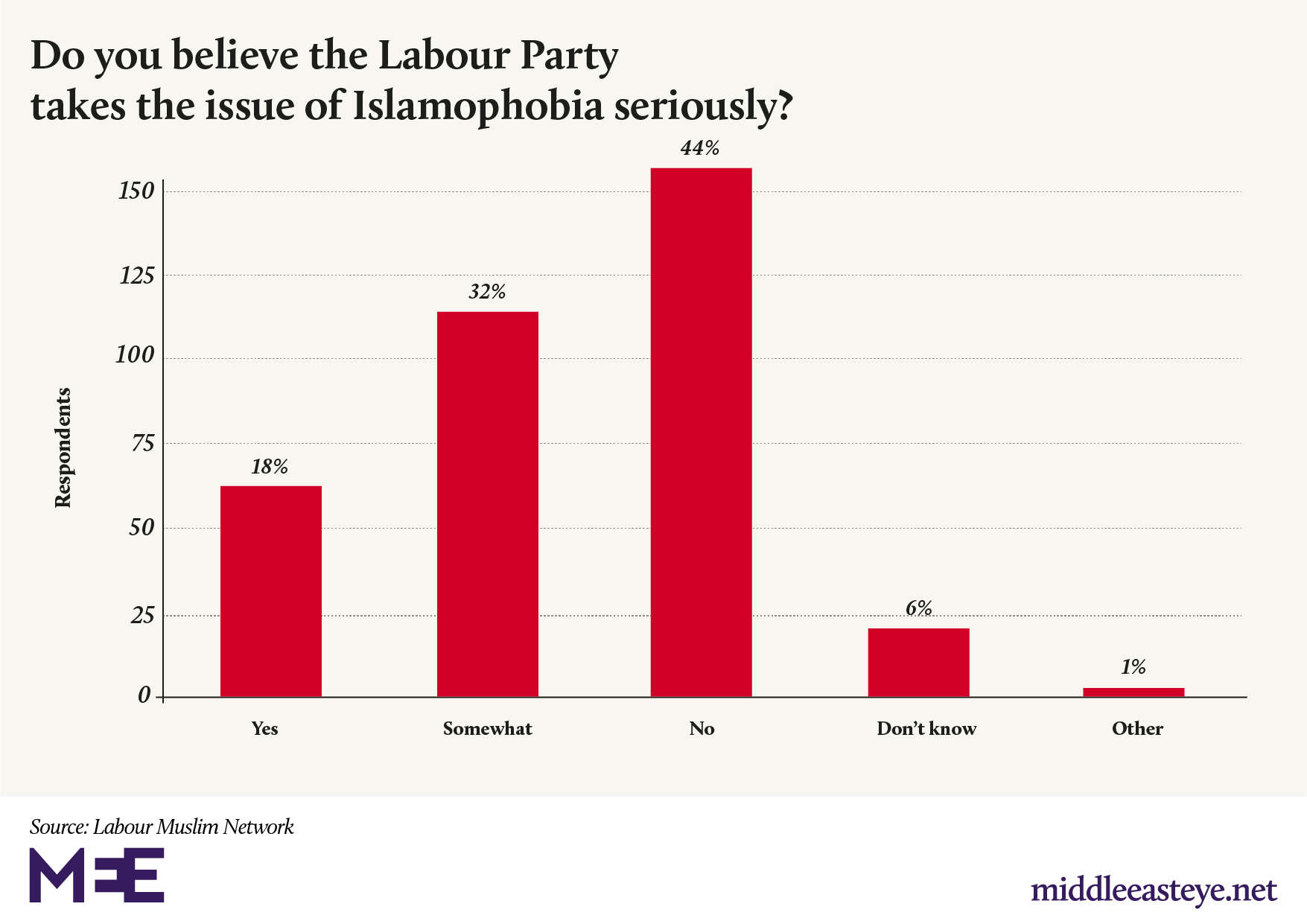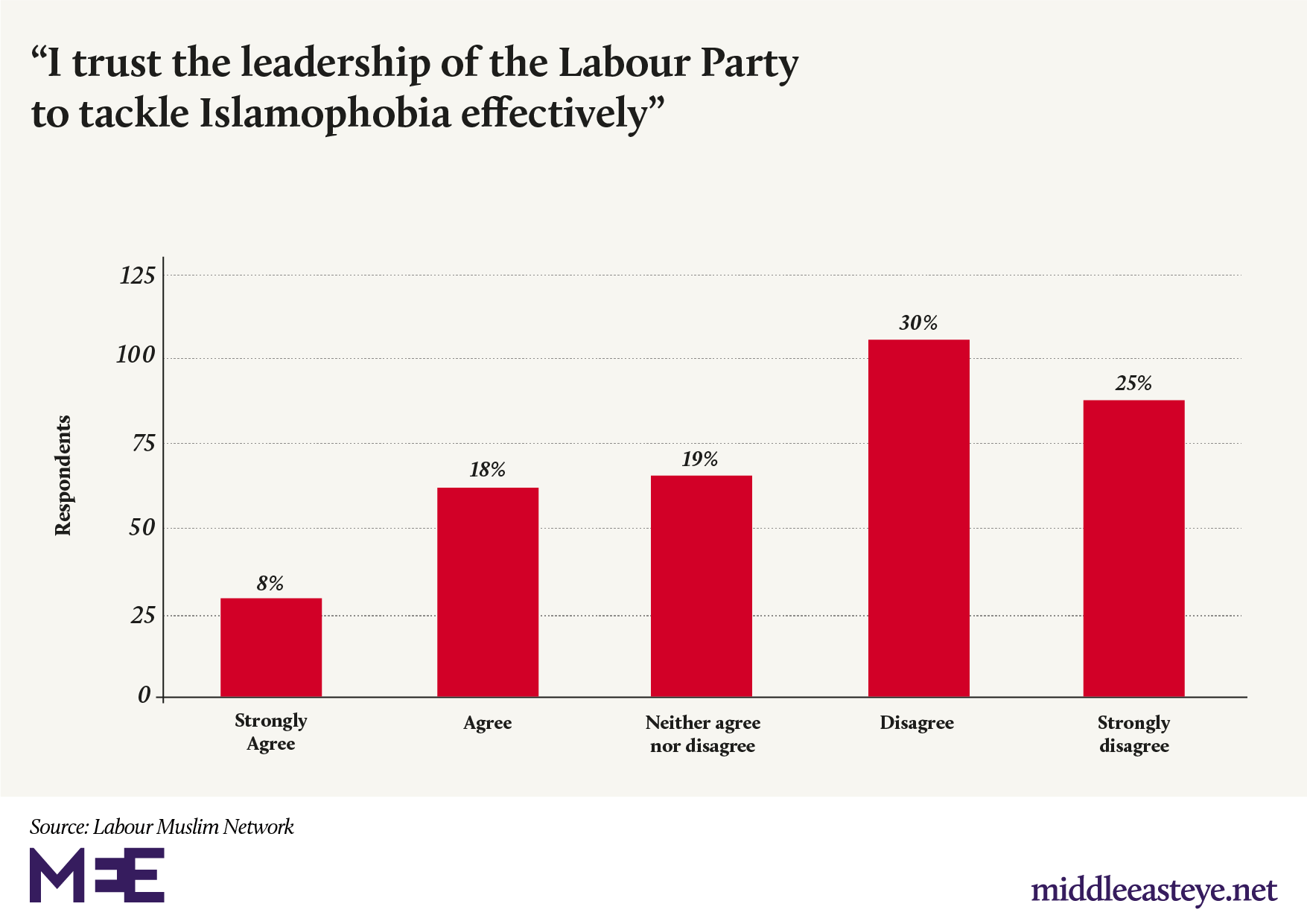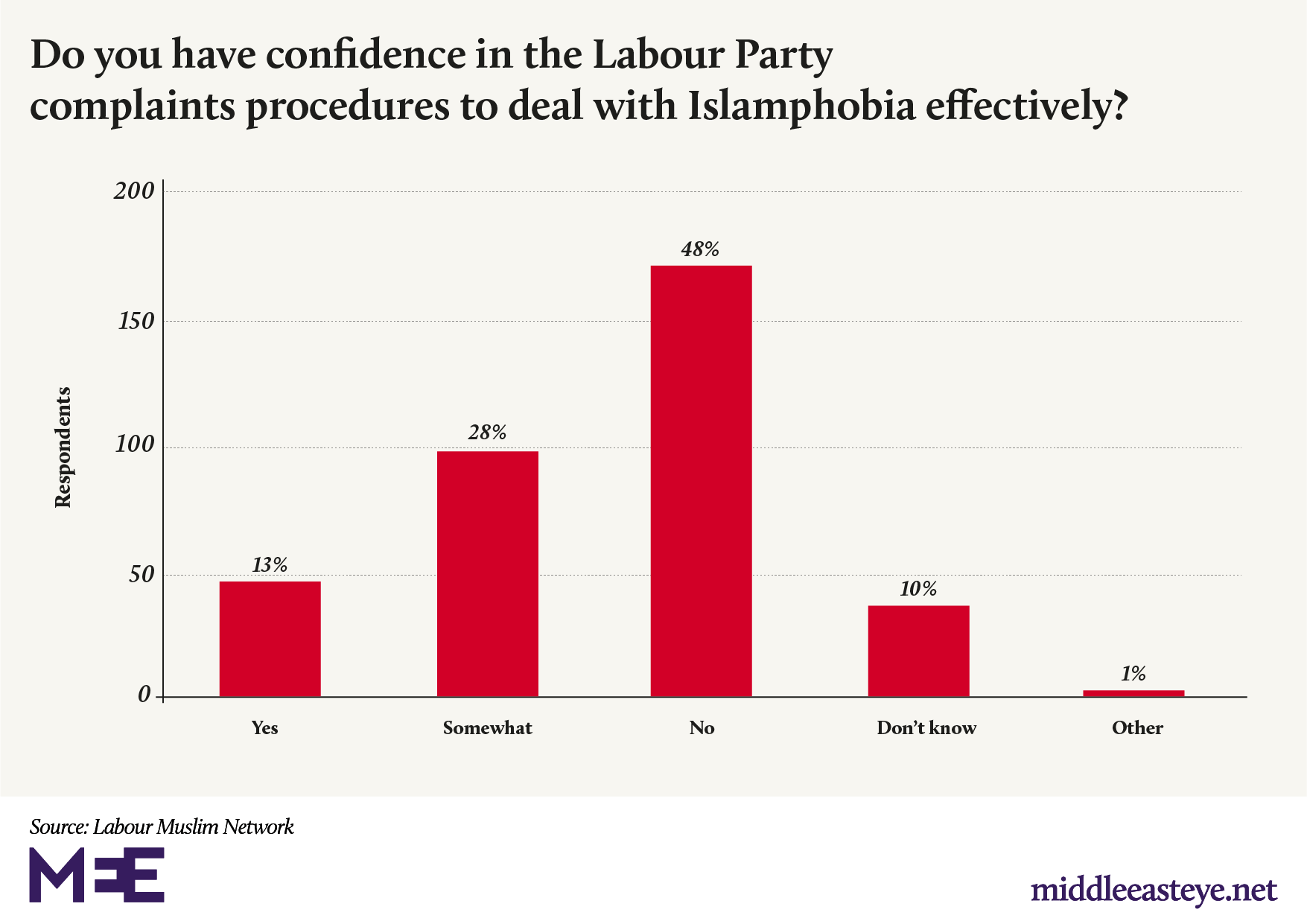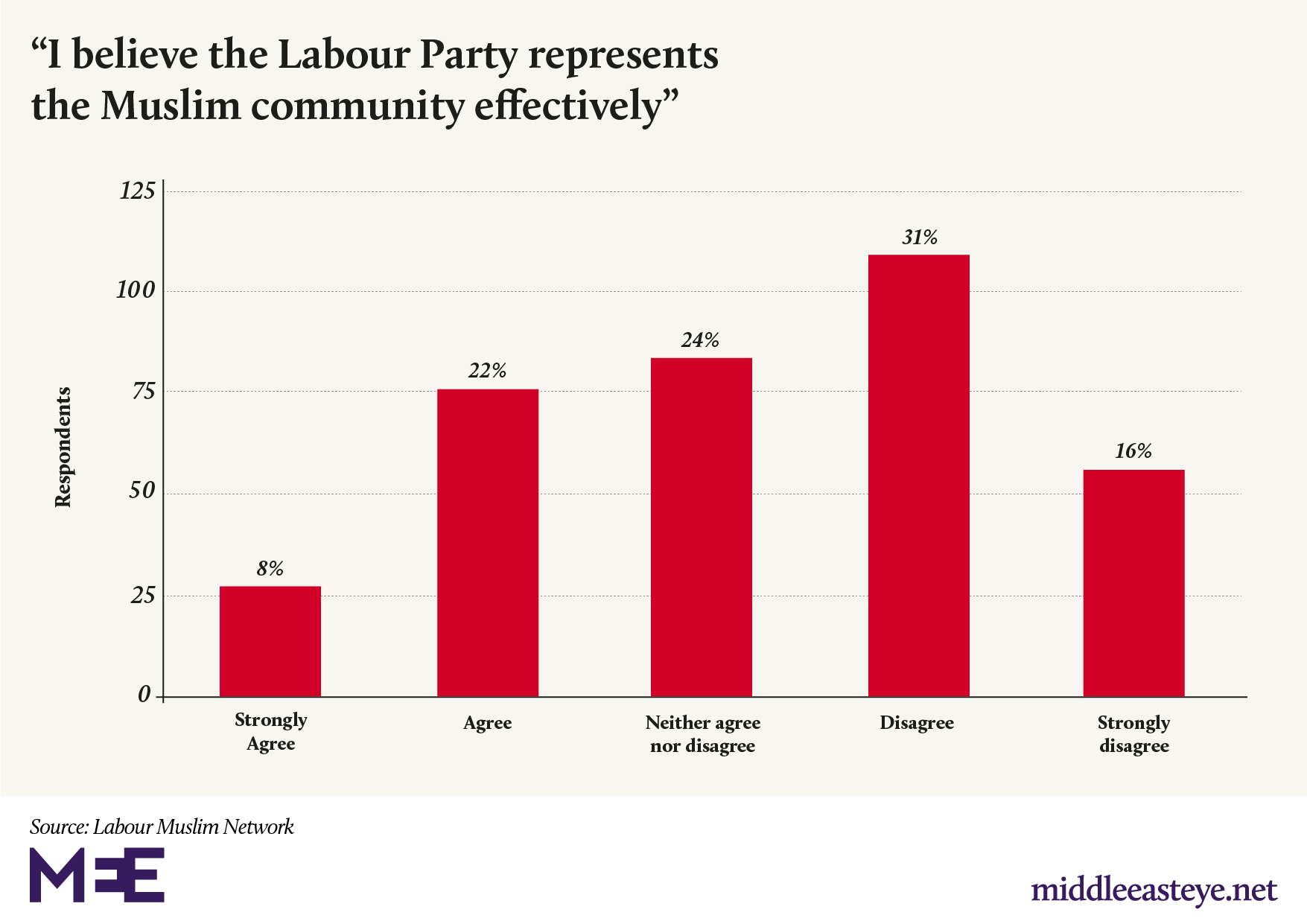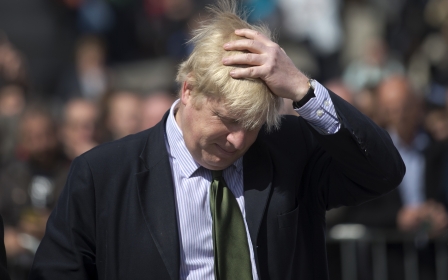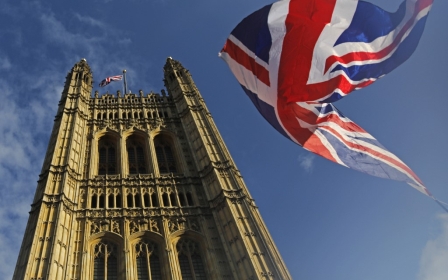Widespread experiences and perceptions of Islamophobia in UK Labour, report reveals
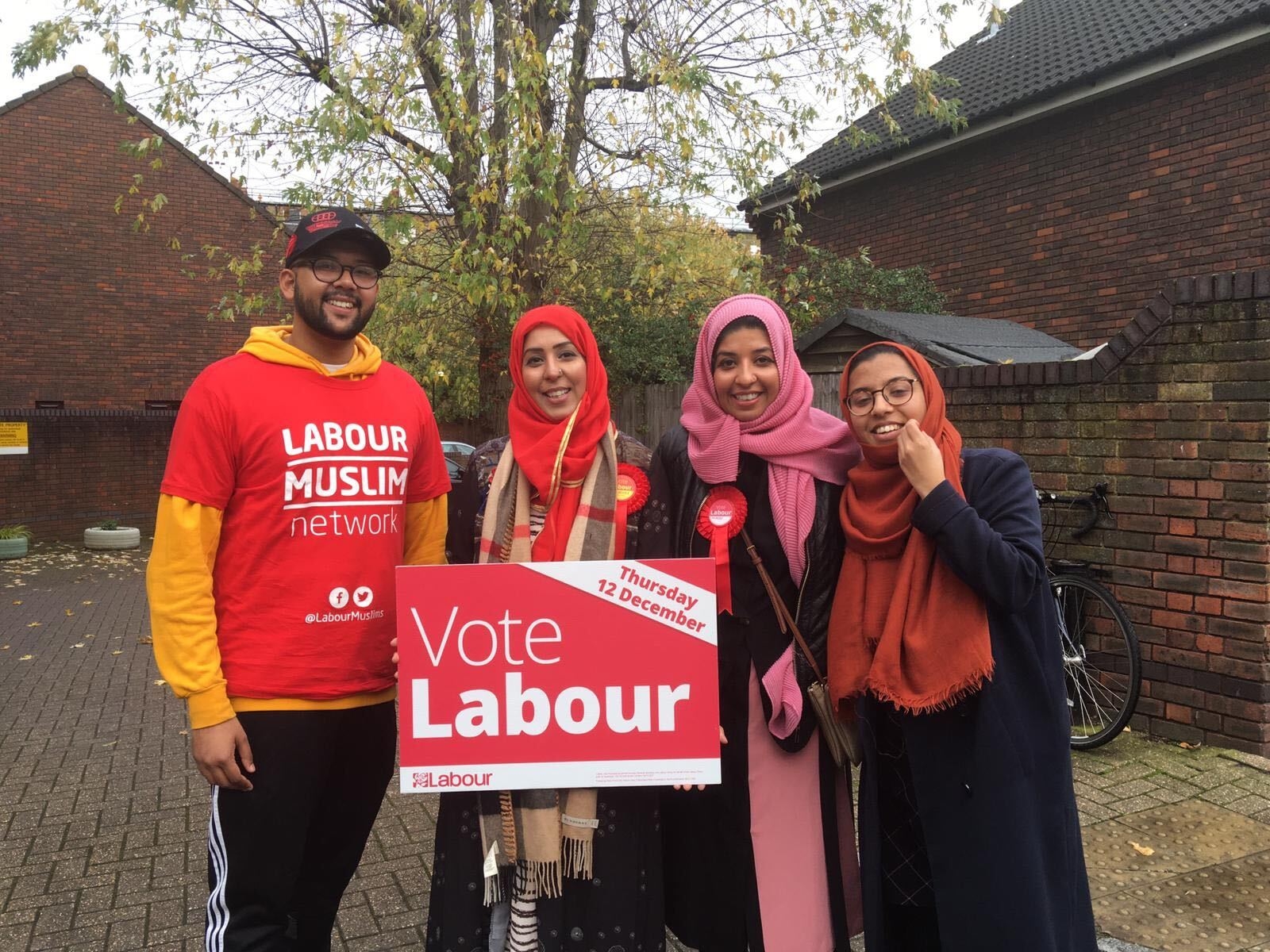
A significant proportion of Muslim supporters of the Labour Party believe the UK's official opposition fails to take the issue of Islamophobia seriously and do not feel represented by the political party or its leadership, a damning report seen by Middle East Eye has revealed.
Advocacy group the Labour Muslim Network (LMN) carried out a wide-ranging survey of Muslim members, supporters and elected officials on their experiences and perceptions of the party.
LMN described the report as "the largest consultation of Muslim members and supporters of the Labour Party in history".
The survey found that nearly half of respondents (44 percent) did not believe Labour took the issue of Islamophobia seriously, while 55 percent did not trust the party's leadership to tackle Islamophobia effectively.
'Now that the problem has been clearly exposed, we hope to see the leadership demonstrating no tolerance for any form of racism by listening to the party's members, and acting immediately, decisively and effectively'
- Muslim Council of Britain
Over a quarter (29 percent) of Muslim members and supporters said they had directly experienced Islamophobia in the party, while over a third (37 percent) had witnessed it taking place.
New MEE newsletter: Jerusalem Dispatch
Sign up to get the latest insights and analysis on Israel-Palestine, alongside Turkey Unpacked and other MEE newsletters
In addition, half of those surveyed did not believe Labour represented the Muslim community well, with a further 59 percent not feeling represented by the leadership of the party. Many members attributed this disconnect with policy positions, including on Kashmir, Palestine and the Prevent counterterrorism strategy.
Responding to MEE's request for comment, Labour leader Keir Starmer and Angela Rayner, deputy leader and party chair, said: "We thank Labour Muslim Network for this important report, as well as their work to ensure our Muslim members are represented, included and heard.
"Islamophobia has no place in our Party or society and we are committed to rooting it out.
"We look forward to working with LMN to implement their recommendations and will be meeting with them to discuss the next steps in tackling the scourge of Islamophobia."
The findings will come as a blow to Starmer, who is already dealing with the fallout from an Equalities and Human Rights Commission (EHRC) report last month that found Labour acted "unlawfully" with regards to accusations of antisemitism within the party.
The opposition has often joined calls for the the ruling Conservative Party to be investigated over claims of Islamophobia, urging Prime Minister Boris Johnson to investigate anti-Muslim racism in his party as recently as September.
Earlier this year, the Muslim Council of Britain (MCB) put together a dossier of examples of Islamophobia from 300 individuals associated with the Conservatives.
The MCB said the new report was "deeply concerning," and showed "shocking levels of Islamophobia" within Labour.
"Now that the problem has been clearly exposed, we hope to see the leadership demonstrating no tolerance for any form of racism by listening to the party's members, and acting immediately, decisively and effectively, starting by adopting the report's recommendations," an MCB spokesperson told Middle East Eye.
Middle East Eye breaks down the key figures and findings from the study:
Muslims face direct Islamophobia within Labour
The report, titled "Islamophobia and the Muslim Experience," surveyed Muslim members, supporters and elected officials between July and August this year.
The survey spoke to 422 people, which LMN estimated was at least 2 percent of Muslim Labour members in the UK.
Only the responses of those who identified as Muslims were recorded, and Muslim elected officials from the party were interviewed by telephone.
When asked whether they had directly experienced Islamophobia within Labour, 50 percent of respondents said they had not. However, a significant 29 percent answered that they had.
The most common occurrences for those who had faced direct Islamophobia included accusations of "planned takeovers" by Muslims participating in local politics and a disproportionate expectation on Muslim members to condemn acts of violence.
There were also stereotypes of "grooming gangs," a common trope directed at Muslims by far-right and anti-Muslim groups in England, and insults using terms such as "terrorist" and "foreigner".
"There are definitely undercurrents of Islamophobia within the Labour Party, stemming from ignorance and systemic racism which may not be overt but does exist," said a Muslim woman respondent aged between 55 and 64.
When Muslim members were asked if they had witnessed Islamophobia within the party, the figure rose to 37 percent.
The report found that the setting of Islamophobic occurrences were evenly distributed between local constituency groups (21 percent), the national party (24 percent) and directly from elected Labour officials (26 percent).
LMN recommended that comprehensive Islamophobia training should be rolled out in conjunction with the MCB and other Muslim organisations, and that a handbook should be published educating members on Islamophobia, including a list of commonly used tropes.
'Hierarchy of racism'
Beyond experiences of Islamophobia, the report also delved into perceptions of how anti-Muslim racism is dealt with in the party.
A striking 44 percent answered "No" to the question of whether Labour took the issue of Islamophobia seriously, while 32 percent answered "Somewhat". Eighteen percent did think it was taken seriously.
Several respondents stated that they believed other forms of racism took precedent over the experience of Muslims.
"There is a hierarchy of racism in the Labour Party and a hierarchy of racists. We all know it, but can't speak it. Until that issue is resolved I do not believe there will be justice for anyone suffering any type of prejudice," one member said.
Specifically with regards to the Labour leadership, 55 percent did not trust the party's leaders to tackle Islamophobia effectively, compared to 26 percent who did.
During the Labour leadership election in January, Starmer voiced his support for a 10-point pledge by the MCB to support Muslim communities, which included tackling racism and Islamophobia.
"We have seen what happens when a political party lets Islamophobia go unchecked. The Conservative Party's problem with Islamophobia is deep-rooted across every part of the party as it has engaged in denial, dismissal and deceit," the MCB told MEE.
"We urge the Labour Party to avoid making the same mistakes the Conservative Party has made, and look at how racism should be tackled, so that it can more fully represent its members and supporters."
Islamophobia complaints procedure 'unfit for purpose'
Forty-eight percent of Muslim members and supporters said they did not have confidence in Labour's complaints procedure to deal with Islamophobic incidents, compared to just 13 percent who did have confidence in it.
Several respondents remarked that they had submitted complaints but had never heard back, sometimes even after over a year had elapsed.
"The complaints system remains unfit for purpose. The sophistication of racism and Islamophobia today is not recognised or accommodated by procedures," said a Muslim woman aged between 35 and 54.
Of those who had reported Islamophobia to the party, 35 percent were dissatisfied with the complaints procedure, compared to just 10 percent who were satisfied. Fifty-five percent said they were neither satisfied nor dissatisfied, with many of those likely to involve active cases pending investigation or action.
The lack of support in the complaints process comes after a leaked internal Labour report alleged that senior members of the party supported Islamophobic views and the party was slow to act in tackling complaints.
The Muslim Engagement and Development organisation (MEND) reported in April that the leak showed an alleged reluctance to take action following a complaint against a local party member who had made 40 Islamophobic, antisemitic and far-right Facebook posts.
Palestine, Kashmir and Prevent concern Muslim members
Nearly half (47 percent) of Muslim members and supporters did not think Labour represented the Muslim community effectively, while 29 percent thought the party did.
When asked if they felt well represented by Labour's leadership, the figure rose to 59 percent who did not, and down to only 21 percent who did feel represented.
On Starmer's shadow cabinet specifically, 55 percent of Muslim disagreed that it represented the Muslim community effectively, while 17 percent agreed.
These figures come despite the fact that six Labour MPs of Muslim background are in the shadow cabinet. In addition, Labour's mayor of London Sadiq Khan is one of the most senior Muslim politicians in Europe.
The study found that Labour's policy positions, particularly those related to foreign policy, impacted how well Muslim members felt represented by the party.
'Whilst the Labour Party has enjoyed the overwhelming support of the Muslim community for decades, we cannot take their support for granted'
- Afzal Khan, parliamentary chair of LMN
Starmer's shift in policy on the Kashmir dispute, which he described as a bilateral matter between India and Pakistan after meeting with an Indian lobby group in April, caused considerable hurt and distress among some Muslim supporters, according to the report. Others raised the issue of Palestine as an area of anxiety.
"To me, it is Islamophobic if the rights of Palestinians are not heard," one respondent said.
On domestic policy, the government's Prevent counterterrorism strategy was raised as a cause of concern. The policy was originally developed under Labour prime minister Tony Blair, and has frequently been described as unfairly targeting Muslim communities.
LMN's research found that Labour's connection to Prevent contributed to why some members did not feel represented by the party.
The perceived poor representation of Muslims will make for worrying reading for Starmer's Labour. Figures from the 2017 general election under then-leader Jeremy Corbyn suggested that 85 percent of Muslims voted for the party.
"Whilst the Labour Party has enjoyed the overwhelming support of the Muslim community for decades, we cannot take their support for granted," said Afzal Khan, parliamentary chair of LMN.
"It is our collective responsibility to ensure that our Muslim membership is being well represented and we must take swift action to tackle Islamophobia within our own ranks."
Middle East Eye delivers independent and unrivalled coverage and analysis of the Middle East, North Africa and beyond. To learn more about republishing this content and the associated fees, please fill out this form. More about MEE can be found here.


